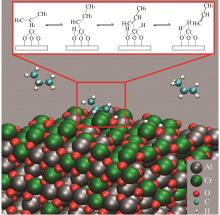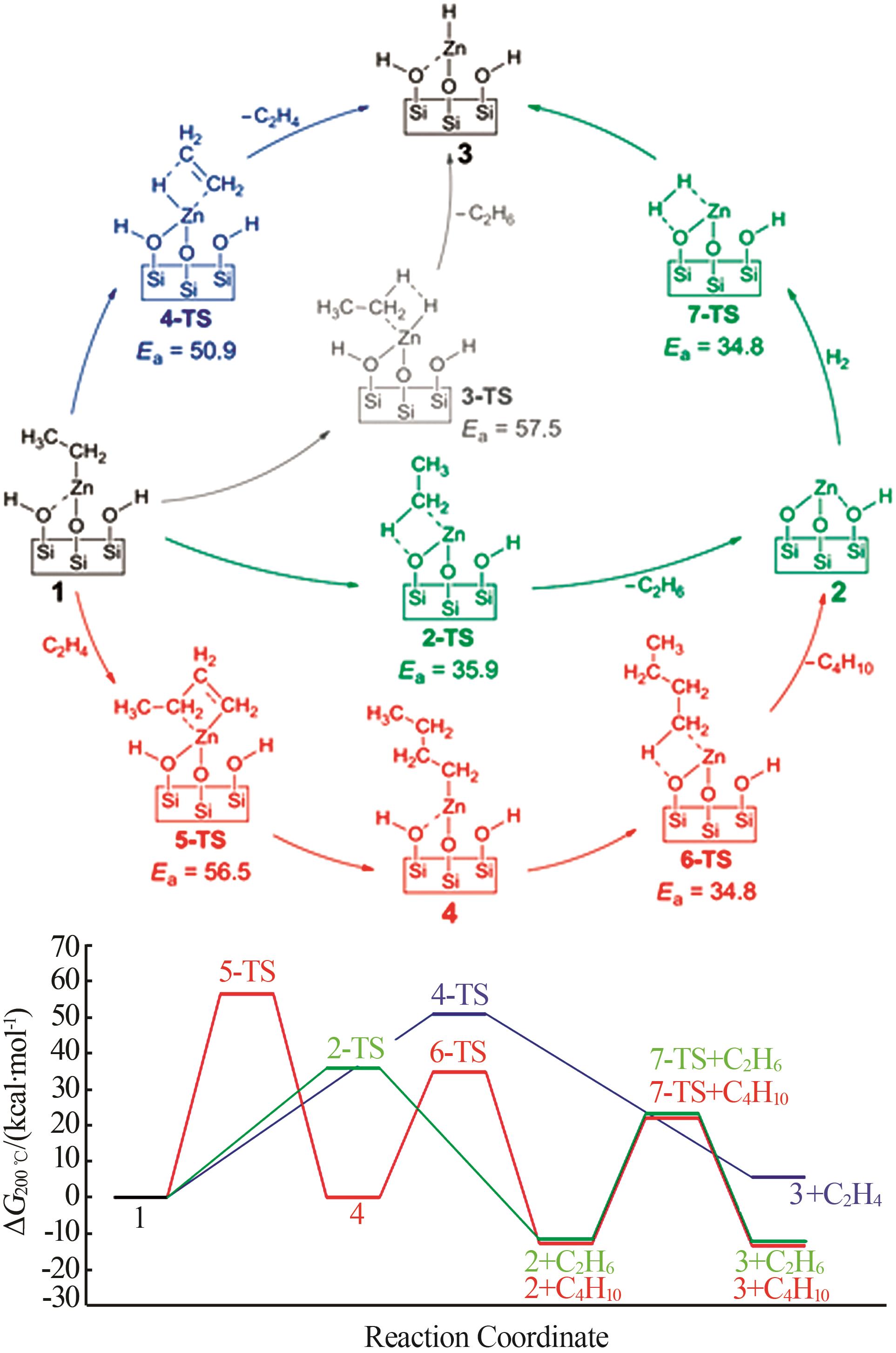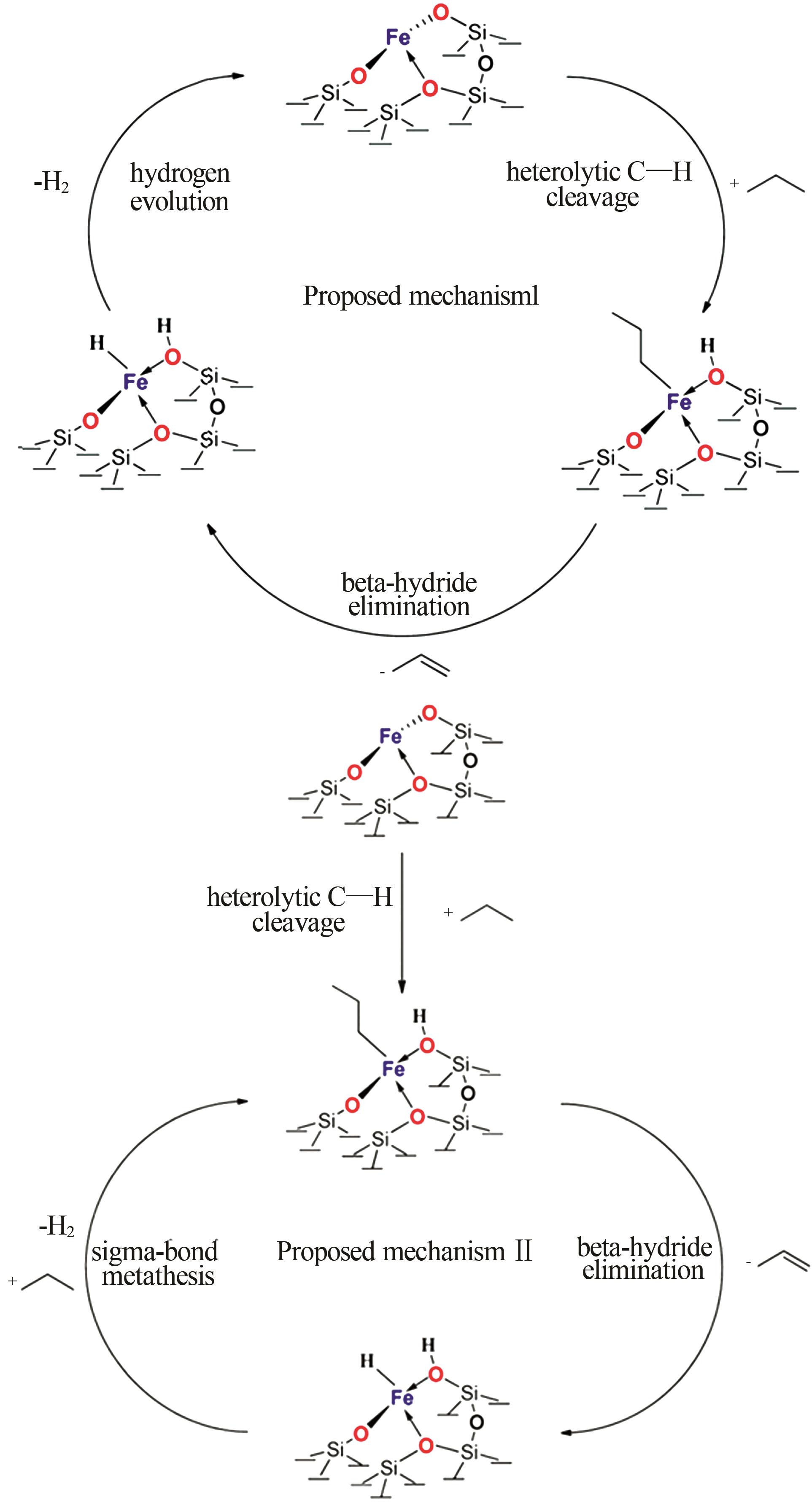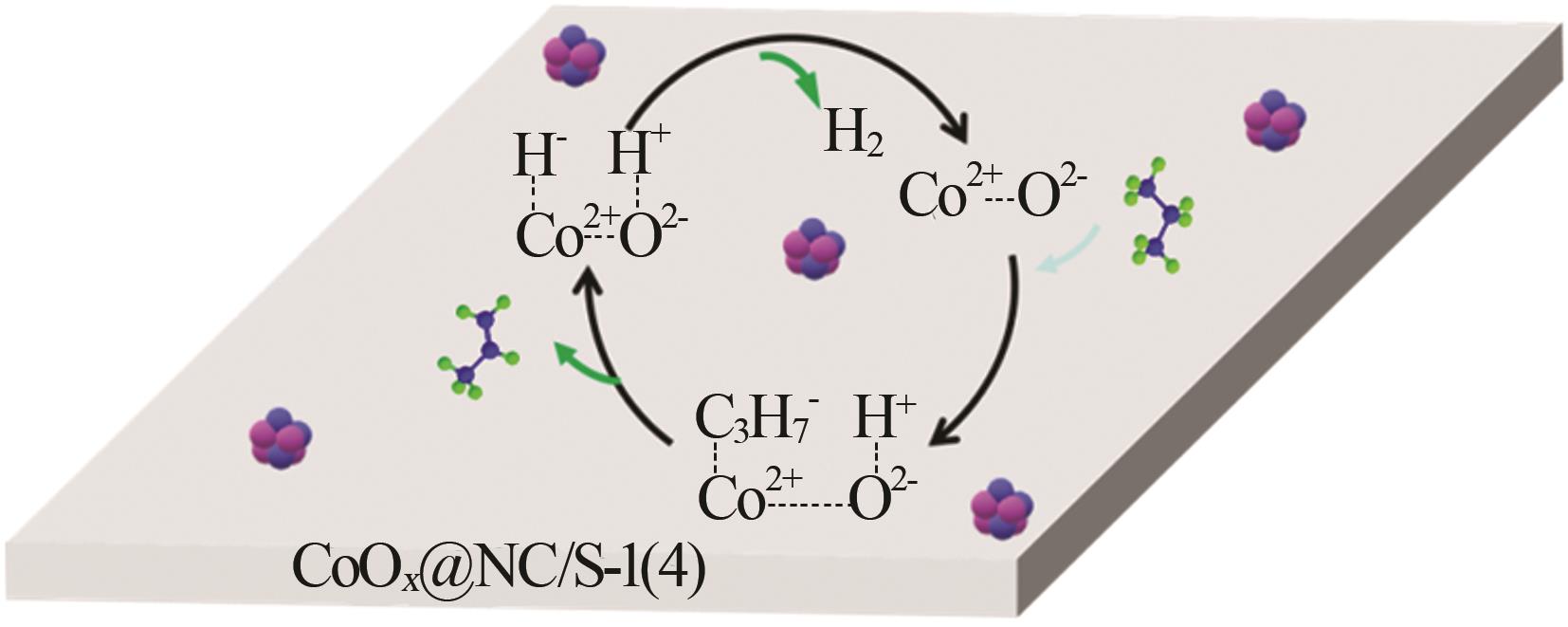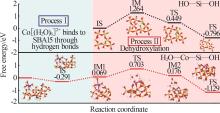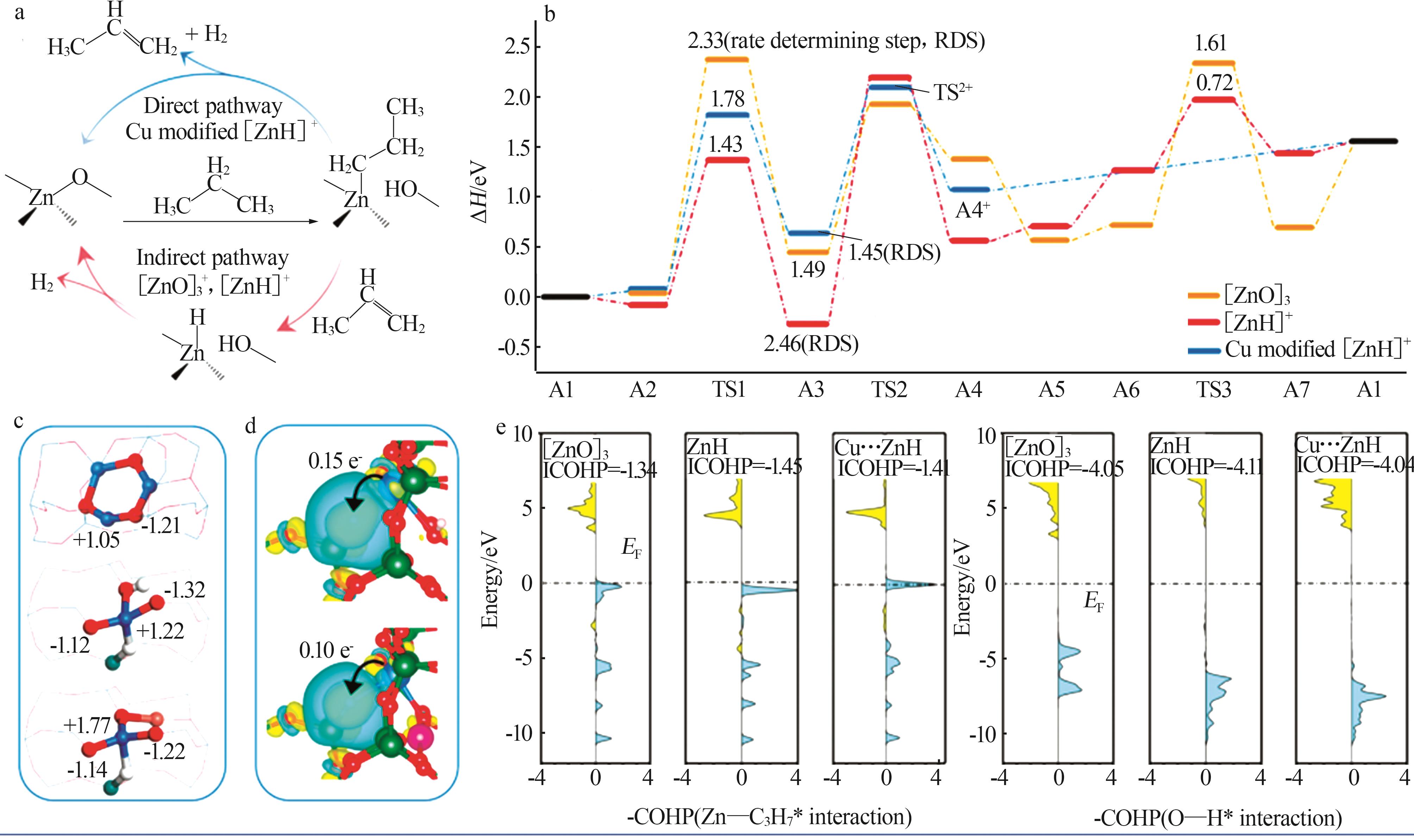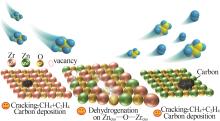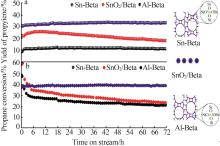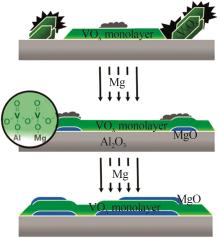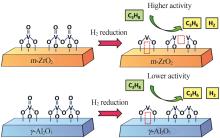Inorganic Chemicals Industry ›› 2023, Vol. 55 ›› Issue (12): 1-11.doi: 10.19964/j.issn.1006-4990.2023-0274
• Reviews and Special Topics • Next Articles
Research progress of non-precious metal catalysts for propane dehydrogenation
WANG Yansu1,2( ), LIU Guozhu1(
), LIU Guozhu1( ), YU Haibin2
), YU Haibin2
- 1. Institute of Chemical Engineering,Tianjin University,Tianjin 300350,China
2. CenterTech Tianjin Chemical Research and Design Institute Co. Ltd.,Tianjin 300131,China
-
Received:2023-05-18Online:2023-12-10Published:2023-12-14 -
Contact:LIU Guozhu E-mail:240465911@qq.com;gliu@tju.edu.cn
CLC Number:
Cite this article
WANG Yansu, LIU Guozhu, YU Haibin. Research progress of non-precious metal catalysts for propane dehydrogenation[J]. Inorganic Chemicals Industry, 2023, 55(12): 1-11.
share this article
Table 1
Catalytic performance of different metal oxide catalysts in propane dehydrogenation to propylene"
| 催化剂 | 反应温度/℃ | 反应原料比 | 丙烷初始转化率/% | 丙烯选择性/% | 失活速率Kd/h-1 |
|---|---|---|---|---|---|
| VO x /ZrO2[ | 550 | φ(C3H8)∶φ(H2)∶φ(N2)=7∶36∶7 | 25 | 85 | 0.549 |
| VO x /Al2O3[ | 600 | φ(C3H8)∶φ(H2)∶φ(N2)=7∶7∶11 | 32 | 约94 | 0.245 |
| Mo-V-O[ | 550 | φ(C3H8)∶φ(N2)=19∶81 | 36 | 89 | |
| Ga8Al2O15[ | 500 | φ(C3H8)∶φ(N2)=1∶39 | 49.7 | 91.7 | 0.086 |
| [Fe]ZSM-5(MFI)[ | 530 | 约7.2 | 约78 | ||
| Sn-HMS[ | 600 | φ(C3H8)∶φ(N2)=5∶95 | 约40 | 约90 | |
| SnO2/SiO2[ | 600 | φ(C3H8)∶φ(N2)=5∶95 | 约30 | 约85 | |
| FeⅡ/SiO2[ | 650 | φ(C3H8)∶φ(Ar)=3∶97 | 4.9 | >99 | |
| Co-Al2O3-HT[ | 590 | φ(C3H8)∶φ(H2)∶φ(N2)=1∶0.8∶3.2 | 23 | 约97 | 0.06 |
| VO x /meso-Al2O3[ | 510 | φ(C3H8)∶φ(N2)=4∶1 | 70 | 约85 | 0.169 |
| GaO x /SiO2[ | 580 | φ(C3H8)∶φ(N2)=1∶10 | 65 | 约90 | 0.136 |
| Co–Al2O3–IMP[ | 590 | φ(C3H8)∶φ(H2)∶φ(N2)=1:0.8:3.2 | 21.2 | 94.6 | 0.16 |
| Co(II)/SiO2[ | 550 | φ(C3H8)∶φ(Ar)=20∶80 | 710 | 72 | 0.07 |
| Co/SiO2[ | 550 | φ(C3H8)∶φ(He)=3∶97 | 3.5 | 92 | 0.008 5 |
| 0.5CoSiBeta[ | 600 | φ(C3H8)∶φ(N2)=5∶95 | 19 | 98.2 | 0.04 |
| Co-Zr/SiO2[ | 550 | φ(C3H8)∶φ(He)=3∶97 | 8.7 | 96 | 0.011 5 |
| ZnO/Beta[ | 600 | φ(C3H8)∶φ(N2)=5∶95 | 52 | 约93 | 0.095 |
Table 1
| 1 |
SUN Minglei, HU Zhongpan, WANG Haoyu, et al. Design strategies of stable catalysts for propane dehydrogenation to propylene[J]. ACS Catalysis, 2023, 13(7):4719-4741.
doi: 10.1021/acscatal.3c00103 |
| 2 |
QI Wei, YAN Pengqiang, SU Dang sheng. Oxidative dehydrogenation on nanocarbon:Insights into the reaction mechanism and kinetics via in situ experimental methods[J]. Accounts of Chemical Research, 2018, 51(3):640-648.
doi: 10.1021/acs.accounts.7b00475 pmid: 29446621 |
| 3 |
CARRERO C A, SCHLOEGL R, WACHS I E, et al. Critical literature review of the kinetics for the oxidative dehydrogenation of propane over well-defined supported vanadium oxide catalysts[J]. ACS Catalysis, 2014, 4(10):3357-3380.
doi: 10.1021/cs5003417 |
| 4 |
张雨宸, 张耀远, 吴芹, 等. 丙烷脱氢用高稳定性Pt基催化剂研究进展[J]. 化工进展, 2022, 41(9):4733-4753.
doi: 10.16085/j.issn.1000-6613.2021-2449 |
|
ZHANG Yuchen, ZHANG Yaoyuan, WU Qin, et al. Advances in high stable Pt based catalysts for propane dehydrogenation[J]. Chemical Industry and Engineering Progress, 2022, 41(9):4733-4753.
doi: 10.16085/j.issn.1000-6613.2021-2449 |
|
| 5 |
WANG Yang, CHEN Sai, SUN Jiachen, et al. Roles of V-O sites for non-oxidative propane dehydrogenation over supported vanadium oxides[J]. Science China Materials, 2023, 66(3):1062-1070.
doi: 10.1007/s40843-022-2214-8 |
| 6 |
SATTLER J J H B, RUIZ-MARTINEZ J, SANTILLAN-JIMENEZ E, et al. Catalytic dehydrogenation of light alkanes on metals and metal oxides[J]. Chemical Reviews, 2014, 114(20):10613- 10653.
doi: 10.1021/cr5002436 pmid: 25163050 |
| 7 |
CAMACHO-BUNQUIN J, AICH P, FERRANDON M, et al. Single-site zinc on silica catalysts for propylene hydrogenation and propane dehydrogenation:Synthesis and reactivity evaluation using an integrated atomic layer deposition-catalysis instrument[J]. Journal of Catalysis, 2017, 345:170-182.
doi: 10.1016/j.jcat.2016.10.017 |
| 8 |
HU Bo, “BEAN” GETSOIAN A, SCHWEITZER N M, et al. Selective propane dehydrogenation with single-site CoII on SiO2 by a non-redox mechanism[J]. Journal of Catalysis, 2015, 322:24-37.
doi: 10.1016/j.jcat.2014.10.018 |
| 9 |
HU Bo, SCHWEITZER N M, ZHANG Guanghui, et al. Isolated FeII on silica as a selective propane dehydrogenation catalyst[J]. ACS Catalysis, 2015, 5(6):3494-3503.
doi: 10.1021/acscatal.5b00248 |
| 10 |
ZHAO Zhijian, WU Tengfang, XIONG Chuanye, et al. Hydroxyl-mediated non-oxidative propane dehydrogenation over VO x /γ-Al2O3 catalysts with improved stability[J]. Angewandte Chemie International Edition, 2018, 57(23):6791-6795.
doi: 10.1002/anie.v57.23 |
| 11 |
ZHANG Yiwei, ZHOU Yuming, HUANG Li, et al. Structure and catalytic properties of the Zn-modified ZSM-5 supported platinum catalyst for propane dehydrogenation[J]. Chemical Engineering Journal, 2015, 270:352-361.
doi: 10.1016/j.cej.2015.01.008 |
| 12 |
ERSOY B, GUNAY V. Effects of La2O3 addition on the thermal stability of γ-Al2O3 gels[J]. Ceramics International, 2004, 30(2):163-170.
doi: 10.1016/S0272-8842(03)00084-1 |
| 13 |
XIE Yufei, LUO Ran, SUN Guodong, et al. Facilitating the reduction of V—O bonds on VO x /ZrO2 catalysts for non-oxidative propane dehydrogenation[J]. Chemical Science, 2020, 11(15):3845-3851.
doi: 10.1039/d0sc00690d pmid: 34122852 |
| 14 |
LIU Gang, ZHAO Zhijian, WU Tengfang, et al. Nature of the active sites of VO x /Al2O3 catalysts for propane dehydrogenation[J]. ACS Catalysis, 2016, 6(8):5207-5214.
doi: 10.1021/acscatal.6b00893 |
| 15 |
CHEN Sai, ZENG Liang, MU Rentao, et al. Modulating lattice oxygen in dual-functional Mo—V—O mixed oxides for chemical looping oxidative dehydrogenation[J]. Journal of the American Chemical Society, 2019, 141(47):18653-18657.
doi: 10.1021/jacs.9b09235 |
| 16 |
CHEN Miao, XU Jie, SU Fangzheng, et al. Dehydrogenation of propane over spinel-type gallia-alumina solid solution catalysts[J]. Journal of Catalysis, 2008, 256(2):293-300.
doi: 10.1016/j.jcat.2008.03.021 |
| 17 |
YUN J H, LOBO R F. Catalytic dehydrogenation of propane over iron-silicate zeolites[J]. Journal of Catalysis, 2014, 312:263- 270.
doi: 10.1016/j.jcat.2014.02.007 |
| 18 |
WANG Guowei, ZHANG Huanling, ZHU Qingqing, et al. Sn-containing hexagonal mesoporous silica(HMS) for catalytic dehydrogenation of propane:An efficient strategy to enhance stabili- ty[J]. Journal of Catalysis, 2017, 351:90-94.
doi: 10.1016/j.jcat.2017.04.018 |
| 19 | WANG Haoren, HUANG Huiwen, BASHIR K, et al. Isolated Sn on mesoporous silica as a highly stable and selective catalyst for the propane dehydrogenation[J]. Applied Catalysis A:General, 2020, 590:117291. |
| 20 |
DAI Yihu, GU Jingjing, TIAN Suyang, et al. γ-Al2O3 sheet-stabilized isolate Co2+ for catalytic propane dehydrogenation[J]. Journal of Catalysis, 2020, 381:482-492.
doi: 10.1016/j.jcat.2019.11.026 |
| 21 | BAI Peng, MA Zhipeng, LI Tingting, et al. Relationship between surface chemistry and catalytic performance of mesoporous γ-Al2O3 supported VO x catalyst in catalytic dehydrogenation of propane[J]. ACS Applied Materials & Interfaces, 2016, 8(39):25979-25990. |
| 22 |
SEARLES K, SIDDIQI G, SAFONOVA O V, et al. Silica-supported isolated gallium sites as highly active,selective and stable propane dehydrogenation catalysts[J]. Chemical Science, 2017, 8(4):2661-2666.
doi: 10.1039/C6SC05178B |
| 23 |
ESTES D P, SIDDIQI G, ALLOUCHE F, et al. C—H activation on Co,O sites:Isolated surface sites versus molecular analogs[J]. Journal of the American Chemical Society, 2016, 138(45):14987-14997.
doi: 10.1021/jacs.6b08705 |
| 24 |
ZHAO Yiqing, SOHN H, HU Bo, et al. Zirconium modification promotes catalytic activity of a single-site cobalt heterogeneous catalyst for propane dehydrogenation[J]. ACS Omega, 2018, 3(9):11117-11127.
doi: 10.1021/acsomega.8b00862 pmid: 31459220 |
| 25 |
CHEN Chong, ZHANG Shoumin, WANG Zheng, et al. Ultrasmall Co confined in the silanols of dealuminated beta zeolite:A highly active and selective catalyst for direct dehydrogenation of propane to propylene[J]. Journal of Catalysis, 2020, 383:77-87.
doi: 10.1016/j.jcat.2019.12.037 |
| 26 | CHEN Chong, HU Zhongpan, REN Jintao, et al. ZnO nanoclusters supported on dealuminated zeolite β as a novel catalyst for direct dehydrogenation of propane to propylene[J]. ChemCat- Chem, 2019, 11(2):868-877. |
| 27 |
HU Zhongpan, QIN Gangqiang, HAN Jingfeng, et al. Atomic insight into the local structure and microenvironment of isolated co-motifs in MFI zeolite frameworks for propane dehydrogenation[J]. Journal of the American Chemical Society, 2022, 144(27):12127-12137.
doi: 10.1021/jacs.2c02636 |
| 28 | 仇新玲, 柴瑞栋, 仲富, 等. 响应面法研究非贵金属Co基催化剂于丙烷脱氢制丙烯的最佳工艺条件[J]. 燃料化学学报, 2022, 50(11):1498-1510. |
|
QIU Xinling, CHAI Ruidong, ZHONG Fu, et al. Investigate of the optimum process conditions for Co/HZSM-5 catalyzed propane dehydrogenation by a response surface method[J]. Journal of Fuel Chemistry and Technology, 2022, 50(11):1498-1510.
doi: 10.1016/S1872-5813(22)60027-6 |
|
| 29 |
FANG Xuejin, LIU Bing, CAO Kun, et al. Particle-size-dependent methane selectivity evolution in cobalt-based fischer-tropsch synthesis[J]. ACS Catalysis, 2020, 10(4):2799-2816.
doi: 10.1021/acscatal.9b05371 |
| 30 | 宋卫余, 罗磊, 王志霞, 等. 用于丙烷脱氢的Co基催化剂及其制备方法: 中国, 115155591B[P]. 2023-08-18. |
| 31 |
SUN Yanan, WU Yimin, SHAN Honghong, et al. Studies on the nature of active cobalt species for the production of methane and propylene in catalytic dehydrogenation of propane[J]. Catalysis Letters, 2015, 145(7):1413-1419.
doi: 10.1007/s10562-015-1533-4 |
| 32 |
LIU Yiwei, LI Zhi, YU Qiuying, et al. A general strategy for fabricating isolated single metal atomic site catalysts in Y zeolite[J]. Journal of the American Chemical Society, 2019, 141(23):9305-9311.
doi: 10.1021/jacs.9b02936 pmid: 31117651 |
| 33 |
LI Zhi, JI Shufang, LIU Yiwei, et al. Well-defined materials for heterogeneous catalysis:From nanoparticles to isolated single-atom sites[J]. Chemical Reviews, 2020, 120(2):623-682.
doi: 10.1021/acs.chemrev.9b00311 pmid: 31868347 |
| 34 |
GROMMET A B, FELLER M, KLAJN R. Chemical reactivity under nanoconfinement[J]. Nature Nanotechnology, 2020, 15(4):256-271.
doi: 10.1038/s41565-020-0652-2 pmid: 32303705 |
| 35 |
LI Zhanyong, PETERS A W, BERNALES V, et al. Metal-organic framework supported cobalt catalysts for the oxidative dehydrogenation of propane at low temperature[J]. ACS Central Science, 2017, 3(1):31-38.
doi: 10.1021/acscentsci.6b00290 pmid: 28149950 |
| 36 |
LI Zhanyong, PETERS A W, PLATERO-PRATS A E, et al. Fine-tuning the activity of metal-organic framework-supported cobalt catalysts for the oxidative dehydrogenation of propane[J]. Journal of the American Chemical Society, 2017, 139(42):15251-15258.
doi: 10.1021/jacs.7b09365 pmid: 28976757 |
| 37 |
BERNALES V, ORTUÑO M A, TRUHLAR D G, et al. Computational design of functionalized metal-organic framework nodes for catalysis[J]. ACS Central Science, 2018, 4(1):5-19.
doi: 10.1021/acscentsci.7b00500 pmid: 29392172 |
| 38 |
ZHAI Quanguo, BU Xianhui, ZHAO Xiang, et al. Pore space partition in metal-organic frameworks[J]. Accounts of Chemical Research, 2017, 50(2):407-417.
doi: 10.1021/acs.accounts.6b00526 pmid: 28106984 |
| 39 |
YANG Zhengkun, CHEN Bingxu, CHEN Wenxing, et al. Directly transforming copper(I) oxide bulk into isolated single-atom copper sites catalyst through gas-transport approach[J]. Nature Communications, 2019, 10:3734.
doi: 10.1038/s41467-019-11796-4 pmid: 31427572 |
| 40 |
SUN Xiaohui, SUAREZ A I O, MEIJERINK M, et al. Manufacture of highly loaded silica-supported cobalt Fischer-Tropsch catalysts from a metal organic framework[J]. Nature Communications, 2017, 8:1680.
doi: 10.1038/s41467-017-01910-9 pmid: 29162823 |
| 41 | YIN Peiqun, YAO Tao, WU Yuen, et al. Single cobalt atoms with precise N-coordination as superior oxygen reduction reaction catalysts[J]. Angewandte Chemie(International Ed.in English), 2016, 55(36):10800-10805. |
| 42 | LUO Shijian, LI Xiaoman, ZHANG Baohai, et al. MOF-derived Co3O4@NC with core-shell structures for N2 electrochemical reduction under ambient conditions[J]. ACS Applied Materials & Interfaces, 2019, 11(30):26891-26897. |
| 43 |
HAN Xiaopeng, LING Xiaofei, WANG Ying, et al. Generation of nanoparticle,atomic-cluster,and single-atom cobalt catalysts from zeolitic imidazole frameworks by spatial isolation and their use in zinc-air batteries[J]. Angewandte Chemie International Edition, 2019, 58(16):5359-5364.
doi: 10.1002/anie.v58.16 |
| 44 |
WANG Yansu, SUO Yujun, REN Jintao, et al. Spatially isolated cobalt oxide sites derived from MOFs for direct propane dehydrogenation[J]. Journal of Colloid and Interface Science, 2021, 594:113-121.
doi: 10.1016/j.jcis.2021.03.023 pmid: 33756359 |
| 45 |
HUANG Zijun, HE Dedong, DENG Weihua, et al. Illustrating new understanding of adsorbed water on silica for inducing tetrahedral cobalt(Ⅱ) for propane dehydrogenation[J]. Nature Communications, 2023, 14:100.
doi: 10.1038/s41467-022-35698-0 pmid: 36609564 |
| 46 |
SCHWEITZER N M, HU Bo, DAS U, et al. Propylene hydrogenation and propane dehydrogenation by a single-site Zn2+ on silica catalyst[J]. ACS Catalysis, 2014, 4(4):1091-1098.
doi: 10.1021/cs401116p |
| 47 |
SONG Shaojia, YANG Kun, ZHANG Peng, et al. Silicalite-1 stabilizes Zn-hydride species for efficient propane dehydrogenati- on[J]. ACS Catalysis, 2022, 12(10):5997-6006.
doi: 10.1021/acscatal.2c00928 |
| 48 |
ZHAO Dan, TIAN Xinxin, DORONKIN D E, et al. in situ formation of ZnO x species for efficient propane dehydrogenation[J]. Nature, 2021, 599(7884):234-238.
doi: 10.1038/s41586-021-03923-3 |
| 49 | QU Yingmin, LI Ganggang, ZHAO Ting, et al. Low-temperature direct dehydrogenation of propane over binary oxide catalysts:Insights into geometric effects and active sites[J]. ACS Sustainable Chemistry & Engineering, 2021, 9(38):12755-12765. |
| 50 |
WANG Guowei, ZHANG Huanling, WANG Haoren, et al. The role of metallic Sn species in catalytic dehydrogenation of propane:Active component rather than only promoter[J]. Journal of Catalysis, 2016, 344:606-608.
doi: 10.1016/j.jcat.2016.11.003 |
| 51 | WANG Haoren, HUANG Huiwen, BASHIR K, et al. Isolated Sn on mesoporous silica as a highly stable and selective catalyst for the propane dehydrogenation[J]. Applied Catalysis A:General, 2020, 590:117291. |
| 52 |
YUE Yuanyuan, FU Jing, WANG Chuanming, et al. Propane dehydrogenation catalyzed by single Lewis acid site in Sn-Beta zeolite[J]. Journal of Catalysis, 2021, 395:155-167.
doi: 10.1016/j.jcat.2020.12.019 |
| 53 | SOKOLOV S, STOYANOVA M, RODEMERCK U, et al. Effect of support on selectivity and on-stream stability of surface VO x species in non-oxidative propane dehydrogenation[J]. Catalysis Science & Technology, 2014, 4(5):1323-1332. |
| 54 |
CHEN Chong, SUN Minglei, HU Zhongpan, et al. Nature of active phase of VO x catalysts supported on Si-Beta for direct dehydrogenation of propane to propylene[J]. Chinese Journal of Catalysis, 2020, 41(2):276-285.
doi: 10.1016/S1872-2067(19)63444-3 |
| 55 |
WU Tengfang, LIU Gang, ZENG Liang, et al. Structure and catalytic consequence of Mg-modified VO x /Al2O3 catalysts for propane dehydrogenation[J]. AIChE Journal, 2017, 63(11):4911-4919.
doi: 10.1002/aic.v63.11 |
| 56 | GU Yu, LIU Haijun, YANG Miaomiao, et al. Highly stable phosphine modified VO x /Al2O3 catalyst in propane dehydrogenation[J]. Applied Catalysis B:Environmental, 2020, 274:119089. |
| 57 |
RODEMERCK U, STOYANOVA M, KONDRATENKO E V, et al. Influence of the kind of VO x structures in VO x /MCM-41 on activity,selectivity and stability in dehydrogenation of propane and isobutane[J]. Journal of Catalysis, 2017, 352:256-263.
doi: 10.1016/j.jcat.2017.05.022 |
| 58 |
XIE Zean, YU Tingting, SONG Weiyu, et al. Highly active nanosized anatase TiO2– x oxide catalysts in situ formed through reduction and Ostwald ripening processes for propane dehydrogenati- on[J]. ACS Catalysis, 2020, 10(24):14678-14693.
doi: 10.1021/acscatal.0c02825 |
| 59 |
SCHREIBER M W, PLAISANCE C P, BAUMGÄRTL M, et al. Lewis-Brønsted acid pairs in Ga/H-ZSM-5 to catalyze dehydrogenation of light alkanes[J]. Journal of the American Chemical Society, 2018, 140(14):4849-4859.
doi: 10.1021/jacs.7b12901 pmid: 29488757 |
| 60 |
PHADKE N M, MANSOOR E, BONDIL M, et al. Mechanism and kinetics of propane dehydrogenation and cracking over Ga/H-MFI prepared via vapor-phase exchange of H-MFI with GaCl3 [J]. Journal of the American Chemical Society, 2019, 141(4):1614-1627.
doi: 10.1021/jacs.8b11443 pmid: 30586991 |
| 61 |
YUAN Yong, LEE J S, LOBO R F. Ga+-chabazite zeolite:A highlhly selective catalyst for nonoxidative propane dehydrogenation[J]. Journal of the American Chemical Society, 2022, 144(33):15079-15092.
doi: 10.1021/jacs.2c03941 pmid: 35793461 |
| 62 |
NI Lingli, KHARE R, BERMEJO-DEVAL R, et al. Highly active and selective sites for propane dehydrogenation in zeolite Ga-BEA[J]. Journal of the American Chemical Society, 2022, 144(27):12347-12356.
doi: 10.1021/jacs.2c03810 |
| 63 |
YUAN Yong, LOBO R F. Propane dehydrogenation over extra-fra-mework In(i) in chabazite zeolites[J]. Chemical Science, 2022, 13(10):2954-2964.
doi: 10.1039/d1sc05866e pmid: 35382476 |
| 64 |
HAN Jingtan, XUE Zhonghua, ZHANG Ke, et al. Atomically dispersed Ni-based anti-coking catalysts for methanol dehydrogenation in a fixed-bed reactor[J]. ACS Catalysis, 2020, 10(21):12569-12574.
doi: 10.1021/acscatal.0c03328 |
| 65 |
MA Rui, GAO Junxian, KOU Jiajing, et al. Insights into the nature of selective nickel sites on Ni/Al2O3 catalysts for propane dehydrogenation[J]. ACS Catalysis, 2022, 12(20):12607-12616.
doi: 10.1021/acscatal.2c03240 |
| [1] | CHEN Junxue, MO Jianxin, ZHOU Zhiyu, LI Zhonglin, WANG Ding, LI Yuping, HU Yongjun, JIANG Xuexian, LI Yibing. Study on synthesis of NaFe x Cr y (SO4)2(OH)6 and their electrochemical properties [J]. Inorganic Chemicals Industry, 2023, 55(8): 71-76. |
| [2] | WANG Yansu, LIU Guozhu, YU Haibin. Research progress of platinum-based propane dehydrogenation catalysts [J]. Inorganic Chemicals Industry, 2023, 55(7): 1-9. |
| [3] | HAN Hongjing, ZHANG Jingze, LAMAO Zhuoma, HAN Jizhe, WU Yongmin, TANG Weiping. Preparation of Al-Co co-doped lithium manganese oxide and its adsorption performance of lithium [J]. Inorganic Chemicals Industry, 2023, 55(7): 38-44. |
| [4] | TIAN Yuling, CHENG Yang, HAN Rong, ZHOU Mei, WANG Chengjie, GE Qiangru. Effect of CaO on heavy metals stability and adsorption properties of sludge-derived biochar [J]. Inorganic Chemicals Industry, 2023, 55(6): 124-129. |
| [5] | LUO Zhibo, WANG Huaiyou, WANG Min, DU Baoqiang. Effect of purity on thermo-physical properties of 60% NaNO3-40% KNO3 binary molten salt [J]. Inorganic Chemicals Industry, 2023, 55(6): 43-49. |
| [6] | XU Chunhui, WANG Feng, LING Changjian, WANG Zirui, TANG Zhongfeng. Research progress of CO2 capture by metal oxides modified by molten salts [J]. Inorganic Chemicals Industry, 2023, 55(5): 1-7. |
| [7] | JIA Yuhong, HU Zhongpan, WANG Kunyuan, HAN Jingfeng, WEI Yingxu, LIU Zhongmin. Co anchored on silanol nests of S-1 zeolite for propane dehydrogenation to propylene [J]. Inorganic Chemicals Industry, 2023, 55(5): 121-127. |
| [8] | HU Yue, MO Hengliang, LI Tianyu, PENG Wenjuan, SUN Guangdong, XIAO Hongkang, CHEN Yili, LI Suoding, TANG Yang. Study on spinning molding and performance of Ti-based lithium ion sieve powder and PVDF resin [J]. Inorganic Chemicals Industry, 2023, 55(11): 58-63. |
| [9] | JI Ying, ZHANG Ying, HOU Xuechao, ZHU Xiaofeng, JIANG Run, PENG Wenjuan, SUN Guangdong, LÜ Long. Application research of titanium adsorbent of carbonate-type salt lake in Tibet [J]. Inorganic Chemicals Industry, 2023, 55(11): 70-77. |
| [10] | PENG Chenxi, LIU Jun. Research progress of layered transition metal oxides cathode materials for sodium-ion batteries [J]. Inorganic Chemicals Industry, 2023, 55(10): 1-12. |
| [11] | HAN Hongjing,WU Yongmin,CAO Yongsheng,HAN Tingting,TANG Weiping. Preparation of nano?flake polyhedral manganese based lithium ion sieve and its adsorption and desorption characteristic for Li+ [J]. Inorganic Chemicals Industry, 2022, 54(8): 59-65. |
| [12] | ZHENG Yangzi,JIN Mingshang. Strategy to improve catalytic performance of Pt-based core-shell catalysts for fuel cells [J]. Inorganic Chemicals Industry, 2022, 54(11): 1-7. |
| [13] | Wang Chenxin,Chen Meili,Tian Mengkui,Yang Wanliang. Study on preparation of hollow α-Fe2O3 nanobelts and their photocatalytic properties [J]. Inorganic Chemicals Industry, 2021, 53(6): 185-189. |
| [14] | Liu Yuhe,Wu Mingsong,Wang Xinshu,Huang Nannan,Zhou Xiuyan. Review of basic properties and influence factors related to stability of chlorine dioxide [J]. Inorganic Chemicals Industry, 2021, 53(3): 18-23. |
| [15] | Zhang Bin,Xiao Xiao,Han Yunjiao,Zhang Yuanyuan,Yu Hongwei. Study on third-step infrared spectroscopy of calcium carbonate [J]. Inorganic Chemicals Industry, 2021, 53(1): 97-101. |
| Viewed | ||||||
|
Full text |
|
|||||
|
Abstract |
|
|||||
|
||
